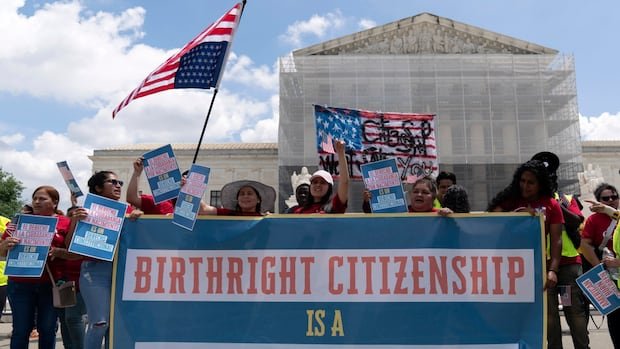Supreme Court Restricts Federal Judges’ Authority Over Nationwide Injunctions
the U.S. Supreme Court has recently delivered a landmark ruling that significantly narrows the power of federal judges to issue broad nationwide injunctions. This decision arose from litigation surrounding former President Donald Trump’s attempt to limit birthright citizenship but deliberately sidestepped the constitutional question itself, focusing instead on the scope of judicial authority.
Recalibrating Judicial Power: nationwide Injunctions under Scrutiny
In a 6-3 decision, with all Republican-appointed justices forming the majority, the Supreme Court directed lower courts to reconsider their expansive injunctions that had blocked enforcement of Trump’s executive order on birthright citizenship. The ruling mandated that these sweeping blocks be confined in scope and postponed implementation of the policy for 30 days after the judgment.
This verdict represents a critical shift in curbing federal courts’ ability to halt government actions across all states simultaneously-a practice increasingly employed in recent years to challenge executive policies rapidly and broadly.
Context: The Birthright Citizenship Debate
On his first day back in office, Donald Trump issued an executive order instructing federal agencies not to recognize as citizens children born on U.S. soil if neither parent is a citizen or lawful permanent resident. Opponents-including attorneys general from over 20 states and immigrant rights organizations-warned this could strip citizenship from more then 150,000 newborns annually.
The plaintiffs argued this directive violates the Fourteenth Amendment’s Citizenship Clause, which guarantees automatic citizenship “to all persons born or naturalized in the United States.” Conversely, government lawyers contended that this clause was originally intended solely for children of former slaves and does not extend citizenship rights to those born unlawfully or temporarily present within U.S. borders.
International Approaches to Birthright Citizenship
Globally, many nations have moved away from unconditional jus soli, or “right of soil,” which grants nationality at birth irrespective of parental status-as remains largely true in Canada today. Countries like Germany and New zealand have reformed their laws requiring at least one parent be a citizen or permanent resident before conferring automatic citizenship at birth. These reforms partly aim to deter “birth tourism,” where expectant mothers travel specifically for childbirth benefits tied to nationality.
The Controversy Surrounding Nationwide injunctions and Forum Shopping
This case also brought attention to concerns about “forum shopping,” where litigants strategically file lawsuits in jurisdictions with judges perceived as more favorable toward their cause. Critics argue such tactics grant disproportionate influence over national policies by allowing individual judges broad authority through nationwide injunctions affecting millions across states.
The Judicial Conference of the United States has been actively considering reforms designed to curb these practices amid bipartisan frustration over expansive judicial orders halting presidential initiatives nationwide.
Justice Amy Coney Barrett remarked:
“What begins today with birthright citizenship could tomorrow extend into areas like gun control or religious liberties.”
Dissent Emphasizes Constitutional Substance Over Procedure
The dissenting justices voiced concern that concentrating solely on procedural limits regarding injunction reach overlooks whether Trump’s executive order itself aligns with constitutional protections under the Fourteenth Amendment. Justice Sonia Sotomayor joined Justices Elena Kagan and Ketanji Brown Jackson in underscoring this point during their dissenting opinions.
A Broader Pattern Favoring Executive Immigration Policies
- The court recently permitted resumption of deportations without full hearings assessing potential harm migrants might face;
- It upheld termination of temporary protected status (TPS) for hundreds of thousands who had received humanitarian relief;
- yet it maintained restrictions blocking deportation efforts against Venezuelan migrants under an outdated wartime statute due to insufficient due process safeguards provided by authorities;
An Ongoing Change With Long-Term Implications
This ruling reshapes how future administrations may implement contentious policies without immediate obstruction by nationwide court orders while fueling ongoing debates about balancing judicial oversight against effective governance amid complex issues such as immigration reform and civil rights protections across America’s diverse population landscape.





